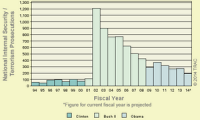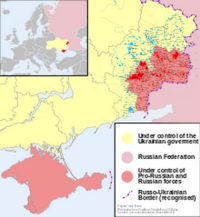-
Populism, conspiracy, and the politics of misinformation

Europeans are being supplanted by foreign invaders, aided by cultural Marxists who are plotting an Islamist subversion of the continent. Angela Merkel is the secret daughter of Adolf Hitler, Barack Obama was illegitimate, and George W. Bush was in on the 9/11 attacks. These are just some of the tales that are told by populist political actors across Europe and the United States.
-
-
New approach needed to arrest democratic decline
A new Brookings report examines the emergence and diffusion of the illiberal toolkit from Turkey to Central Europe. It assesses how illiberal political actors have eroded checks and balances in several countries within the European Union and NATO and proposes concrete policy options for responding to democratic decline.
-
-
U.S. offers up to $1 million reward for information on Bin Laden son Hamza
The United States has offered a reward of up to $1 million for information leading to the “identification or location” of the son of Osama bin Laden, the deceased leader of the Al-Qaeda terror organization. “Hamza bin Laden is the son of deceased former AQ leader Osama bin Laden and is emerging as a leader in the AQ franchise,” a State Department statement said on 28 February, using an acronym for the extremist group.
-
-
Is it more dangerous to let Islamic State foreign fighters from the West return or prevent them from coming back?
The United states and other countries around the world are dealing with the same question: Should their citizens who join foreign terrorist organizations and fight for them be allowed to return to their home country? Determining which approach makes Western countries safest requires examining the facts about foreign fighters.
-
-
“We are not winning” counterterror war in Sahel, U.S. military leader in Africa says
The United States and its allies are not winning the counterterrorism war for the Sahel, the head of U.S. special operations forces in Africa said. The U.N. said last week that more than 100,000 people in Burkino Faso have been displaced by violence, and the country’s education minister has said more than 150,000 children are not going to school because of the jihadist threat.
-
-
Biolabs accidents, and genetic modification research
Exposures to infectious diseases in Bioafety level-3 (BSL-3) and BSL-4 environments can be scary, but they do happen. Concern has always extended beyond the safety of the laboratory worker, but also that a pathogen of pandemic potential could be released. Other aspects of lab safety have raised concern as well, as more attention has been directed toward gain-of-function (GoF) research.
-
-
U.S. Cyber Command cut Russian troll factory’s access to the internet

The U.S. Cyber Command blocked the internet access of the St. Petersburg’s-based Internet Research Agency (IRA), a Russian disinformation and propaganda outfit which was contracted by the Kremlin to orchestrate the social media disinformation campaign to help Donald Trump win the 2016 presidential election. The IRA’s access to the internet was blocked on midterms Election Day, and for a few days following the election.
-
-
Will terrorism continue to decline in 2019?

Lost in the headlines, rapidly accelerating news cycles and the pervasive fear generated by terrorist threats is the fact that terrorist attacks worldwide have actually been declining – in some areas substantially. From 2002 through 2014, worldwide terrorist attacks increased by 12 times and terrorist fatalities increased by more than eight times. But since 2014, the picture has changed dramatically – a development that has gone largely unreported in the media.
-
-
“Crimea must be returned to Ukraine,” U.S. tells Russia

The United States has reaffirmed that it will maintain sanctions on Russia until it returns control of Crimea to Ukraine, nearly five years after Moscow annexed the peninsula. U.S. Secretary of State Mike Pompeo said. “Crimea is Ukraine and must be returned to Ukraine’s control,” a U.S. State Department statement quoted Pompeo as saying.
-
-
Experts question BioWatch’s replacement
BioWatch, the program launched more than fifteen years ago to detect bioterrorism attacks in major American cities, has been routinely criticized for not living up to its early promise. Many have suggested doing away with the system all together. Trouble is, experts say that BioDetection 21 – DHS’s proposed replacement for BioWatch – is even less effective.
-
-
Report finds that Corbyn aide, Seumas Milne, has ties to Hamas
An explosive investigative report by a British newspaper has unearthed long-standing ties between Seumas Milne, a senior aide to the Labour Party’s leader Jeremy Corbyn, and terrorist organizations committed to the destruction of Israel. The investigation also revealed Milne’s extensive ties to organizations linked to the Kremlin. Sir Richard Dearlove, who led the Secret Intelligence Service MI6 from 1999 to 2004, said: “Anyone with his sort of background could not be let anywhere near classified information. It would be out of the question. That means Corbyn could not make the judgments and decisions a PM has to make unless he stopped consulting him.”
-
-
Telegram used by ISIS to spread propaganda globally
The Counter Extremism Project (CEP) this week reports about a Telegram channel that called for lone actor terrorist attacks in London, alongside other online websites that host ISIS videos and propaganda online. The encrypted messaging app is the platform of choice for terrorist group to call for violence.
-
-
Anti-Semitism in Venezuela: Maduro regime traffics in hateful conspiracies
As the political crisis continues in Venezuela, the hardline regime of Nicolas Maduro, whose power is currently being challenged, is promoting hateful anti-Semitic conspiracy theories and allegations of Jewish or “Zionist” plots to take over the government.
-
-
Why authoritarians love the concept of the Big Conspiracy
The idea of a Shadow World Government has always been very popular among conspiracy theorists. Its manifestations might be different, but generally the concept conjures up the image of a small group of men, deciding the fate of the world behind the scenes; puppet-masters, covertly controlling the world. Rulers of the rulers.
-
-
Better monitoring of nuclear power plants, nuclear proliferation
The United Kingdom is investing nearly £10 million (about $12.7 million) in a joint project with the United States to harness existing particle physics research techniques to remotely monitor nuclear reactors. Expected to be operational in 2024, the Advanced Instrumentation Testbed (AIT) project’s 6,500-ton detector will measure the harmless subatomic particles called antineutrinos that are emitted by an existing nuclear power plant 25 kilometers, or about 15.5 miles, away.
-
More headlines
The long view
What Does Netflix’s Drama “Adolescence” Tell Us About Incels and the Manosphere?
While Netflix’s psychological crime drama ‘Adolescence’ is a work of fiction, its themes offer insight into the very real and troubling rise of the incel and manosphere culture online.
A Shining Star in a Contentious Legacy: Could Marty Makary Be the Saving Grace of a Divisive Presidency?
While much of the Trump administration has sparked controversy, the FDA’s consumer-first reforms may be remembered as its brightest legacy. From AI-driven drug reviews to bans on artificial dyes, the FDA’s agenda resonates with the public in ways few Trump-era policies have.
The Center Can Hold — States’ Rights and Local Privilege in a Climate of Federal Overreach
As American institutions weather the storms of executive disruption, legal ambiguity, and polarized governance, we must reexamine what it means for “the center” to hold.
How to Reverse Nation’s Declining Birth Rate
Health experts urge policies that buoy families: lower living costs, affordable childcare, help for older parents who want more kids
Foundation for U.S. Breakthroughs Feels Shakier to Researchers
With each dollar of its grants, the National Institutes of Health —the world’s largest funder of biomedical research —generates, on average, $2.56 worth of economic activity across all 50 states. NIH grants also support more than 400,000 U.S. jobs, and have been a central force in establishing the country’s dominance in medical research. Waves of funding cuts and grant terminations under the second Trump administration are a threat to the U.S. status as driver of scientific progress, and to the nation’s economy.
The True Cost of Abandoning Science
“We now face a choice: to remain at the vanguard of scientific inquiry through sound investment, or to cede our leadership and watch others answer the big questions that have confounded humanity for millennia —and reap the rewards.”
